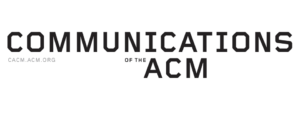 The Communications of the ACM (CACM), the print and online publication for the Association of Computing Machinery (ACM), has recently released a Viewpoints article titled, “Ask Not What Your Postdoc Can Do for You” from the leads of the Computing Community Consortium’s (CCC) Postdoc Best Practices program (Postdocs BP). The program, with the backing of the National Science Foundation (NSF), will conclude this summer. The Postdocs BP program was a follow-on to the Computing Innovation Fellows project, which ran from 2009 – 2014. Three different universities/consortia received awards in 2014 to develop, implement and institutionalize the implementation of best practices for supporting postdocs in computing.
The Communications of the ACM (CACM), the print and online publication for the Association of Computing Machinery (ACM), has recently released a Viewpoints article titled, “Ask Not What Your Postdoc Can Do for You” from the leads of the Computing Community Consortium’s (CCC) Postdoc Best Practices program (Postdocs BP). The program, with the backing of the National Science Foundation (NSF), will conclude this summer. The Postdocs BP program was a follow-on to the Computing Innovation Fellows project, which ran from 2009 – 2014. Three different universities/consortia received awards in 2014 to develop, implement and institutionalize the implementation of best practices for supporting postdocs in computing.
The three groups are:
- The University of Washington (UW)
- Arizona (AZ), made up of Arizona State (ASU), the University of Arizona (U of A), and Northern Arizona University (NAU)
- NYC ASCENT (NY), made up of Columbia University, New York University (NYU), Cornell University, and The City University of New York (CUNY).
The Viewpoint discusses some of the strategies that the leads found effective at improving the post grad’s experiences and attempts to raise awareness about the needs of the postdoc community in computer science departments. As the article states, “Historically, postdocs have been ‘invisible’: they work closely with their faculty advisers and that adviser’s group, but have had little standing in the department or university. In essence they have not been ‘first-class citizens.’ This situation warrants investigating the best ways to support the career and contribution of postdocs. Concerns to address include the quality of training the postdoc receives, the quality of mentoring, the development of new skills, and the participation of postdocs in the community—both in their university department community and in the research community.”
The article highlights challenges to CS postdocs in the areas of career goals, mentoring, skills acquisition, networking, belonging, and institutional support. Both the NY and AZ programs require the creation of an Individual Development Plan (IDP) in order to facilitate the thoughtful development and evaluation of career goals. In the IDP, postdocs come up with specific, time-based goals. “NY requires the postdoc to discuss goals identified in his/her IDP with his/ her advisor but leaves the submitted document confidential to the postdoc. In contrast, UW has created an online “Review of Progress” system similar to an IDP; the form must be filled out every six months, followed by required meetings with the postdoc’s adviser to discuss goals and progress toward them. The Review form is tracked electronically to ensure compliance, and to identify problems. NY, AZ and UW have all found the written plans to be very effective.”
The three programs also place a priority on providing access to workshops and events for developing and acquiring relevant skills. “NY has a particularly strong program of frequently offered workshops and panels to develop leadership skills, academic writing, grant writing, teaching, public speaking, and entrepreneurship…AZ offers panels, workshops, and mini-conferences that overlap with NY’s described above, but also include topics such diversity and ethics. UW offers competitive awards that fund undergraduates to work on the postdoc’s independent research.”
The programs have also dedicated institutional support in the form of staff to help ensure the postdoc’s sense of belonging within the department. “AZ has instituted weekly research presentations by faculty and invited speakers… it also holds monthly informal lunches with postdocs and faculty to discuss future events,” while “UW has established per postdoc on-boarding orientations, email announcement of each postdoc arrival, department Web-page announcement of any major postdoc accomplishments, monthly postdoc only lunches, an annual lunch with the department chair, inclusion in all email pertaining to researchers, and encouragement to attend the frequent social activities offered by the department”
To learn more about the best practices utilized by the programs, read the full article on the CACM website (login required). You can also find out more about the Postdocs Best Practices program on the CCC website and find resources for postdocs, such as template IDPs here.









